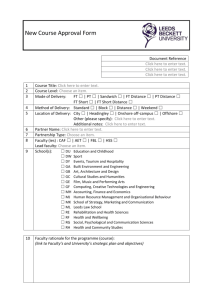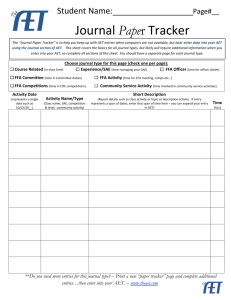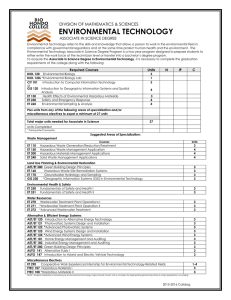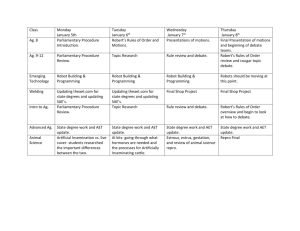Automotive Engineering Technology
advertisement
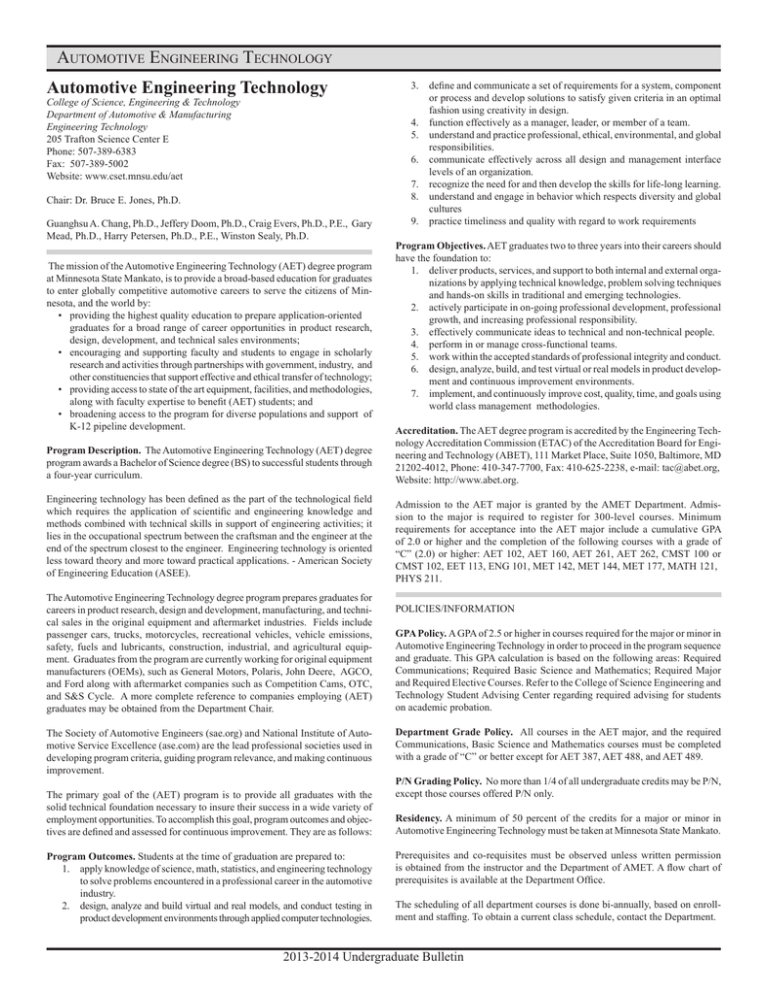
Automotive engineering technology Automotive Engineering Technology College of Science, Engineering & Technology Department of Automotive & Manufacturing Engineering Technology 205 Trafton Science Center E Phone: 507-389-6383 Fax: 507-389-5002 Website: www.cset.mnsu.edu/aet 4. 5. 6. 7. 8. Chair: Dr. Bruce E. Jones, Ph.D. Guanghsu A. Chang, Ph.D., Jeffery Doom, Ph.D., Craig Evers, Ph.D., P.E., Gary Mead, Ph.D., Harry Petersen, Ph.D., P.E., Winston Sealy, Ph.D. The mission of the Automotive Engineering Technology (AET) degree program at Minnesota State Mankato, is to provide a broad-based education for graduates to enter globally competitive automotive careers to serve the citizens of Minnesota, and the world by: graduates for a broad range of career opportunities in product research, design, development, and technical sales environments; research and activities through partnerships with government, industry, and other constituencies that support effective and ethical transfer of technology; or process and develop solutions to satisfy given criteria in an optimal fashion using creativity in design. function effectively as a manager, leader, or member of a team. understand and practice professional, ethical, environmental, and global responsibilities. communicate effectively across all design and management interface levels of an organization. recognize the need for and then develop the skills for life-long learning. understand and engage in behavior which respects diversity and global cultures Program Objectives. AET graduates two to three years into their careers should have the foundation to: 1. deliver products, services, and support to both internal and external orga2. 3. 4. 5. 6. and hands-on skills in traditional and emerging technologies. actively participate in on-going professional development, professional growth, and increasing professional responsibility. effectively communicate ideas to technical and non-technical people. perform in or manage cross-functional teams. work within the accepted standards of professional integrity and conduct. design, analyze, build, and test virtual or real models in product development and continuous improvement environments. world class management methodologies. K-12 pipeline development. Program Description. The Automotive Engineering Technology (AET) degree program awards a Bachelor of Science degree (BS) to successful students through a four-year curriculum. Accreditation. The AET degree program is accredited by the Engineering Technology Accreditation Commission (ETAC) of the Accreditation Board for Engineering and Technology (ABET), 111 Market Place, Suite 1050, Baltimore, MD 21202-4012, Phone: 410-347-7700, Fax: 410-625-2238, e-mail: tac@abet.org, Website: http://www.abet.org. Admission to the AET major is granted by the AMET Department. Admis- methods combined with technical skills in support of engineering activities; it lies in the occupational spectrum between the craftsman and the engineer at the end of the spectrum closest to the engineer. Engineering technology is oriented less toward theory and more toward practical applications. - American Society of Engineering Education (ASEE). The Automotive Engineering Technology degree program prepares graduates for careers in product research, design and development, manufacturing, and technipassenger cars, trucks, motorcycles, recreational vehicles, vehicle emissions, manufacturers (OEMs), such as General Motors, Polaris, John Deere, AGCO, and Ford along with aftermarket companies such as Competition Cams, OTC, and S&S Cycle. A more complete reference to companies employing (AET) graduates may be obtained from the Department Chair. The Society of Automotive Engineers (sae.org) and National Institute of Automotive Service Excellence (ase.com) are the lead professional societies used in developing program criteria, guiding program relevance, and making continuous improvement. The primary goal of the (AET) program is to provide all graduates with the solid technical foundation necessary to insure their success in a wide variety of employment opportunities. To accomplish this goal, program outcomes and objecProgram Outcomes. Students at the time of graduation are prepared to: 1. apply knowledge of science, math, statistics, and engineering technology to solve problems encountered in a professional career in the automotive industry. 2. design, analyze and build virtual and real models, and conduct testing in product development environments through applied computer technologies. of 2.0 or higher and the completion of the following courses with a grade of “C” (2.0) or higher: AET 102, AET 160, AET 261, AET 262, CMST 100 or CMST 102, EET 113, ENG 101, MET 142, MET 144, MET 177, MATH 121, PHYS 211. POLICIES/INFORMATION GPA Policy. on academic probation. Department Grade Policy. Communications, Basic Science and Mathematics courses must be completed with a grade of “C” or better except for AET 387, AET 488, and AET 489. P/N Grading Policy. No more than 1/4 of all undergraduate credits may be P/N, except those courses offered P/N only. Residency. A minimum of 50 percent of the credits for a major or minor in Automotive Engineering Technology must be taken at Minnesota State Mankato. The scheduling of all department courses is done bi-annually, based on enroll- 2013-2014 Undergraduate Bulletin Automotive engineering technology AUTOMOTIVE ENGINEERING TECHNOLOGY BS Required General Education CHEM 104 Introduction to Chemistry (3) ENG 271W Technical Communication (4) MATH 115 Precalculus Mathematics (4) STAT 154 Elementary Statistics (3) Prerequisites for Major AET 102 Introduction to Automotive Engineering Technology (1) AET 160 Automotive Technology & Systems (4) AET 261 Automotive Driveability & Diagnosis (4) AET 262 Automotive Computers and Electronics (4) EET 113 DC Circuits (3) ENG 101 Composition (4) MATH 121 Calculus I (4) MET 142 Introduction to Parametric Modeling (3) MET 144 Product Development & Design (3) MET 177 Materials Processing I and Metallurgy (4) PHYS 211 Principles of Physics I (4) Communication Studies (Choose 3 credits) CMST 100 Fundamentals of Speech Communication (3) CMST 102 Public Speaking (3) Major Common Core AET 334 Fluid Power (3) AET 364 Chassis Design and Performance Testing (4) AET 366 Automotive Thermodynamics and Engine Design (3) AET 378 Composite Materials (3) AET 387 Junior Design Project (1) AET 465 Automotive Laboratory Experience (2) AET 468 Automotive Research Methods (4) AET 488 Senior Design Project I (3) AET 489 Senior Design Project II (3) MATH 122 Calculus II (4) MET 323 Statics (3) MET 324 Strength of Materials and Dynamics (4) MET 341 Advanced Computer Aided Design (3) MET 424 Industrial Safety (2) PHYS 212 Principles of Physics II (4) Major Restricted Electives Programming (Choose 2-3 credits) CS 171 Introduction to C++ Programming (2) EET 315 Programmable Instrumentation (3) Required Minor: None AviAtion AET 160 (4) Automotive Technology & Systems This course is centered on the theory, operation and service of the systems found in modern automobiles. Lectures and demonstrations cover the course topics and open lab sessions allow students to practice procedures on their own vehicles in the completion of course assignments. Fall, Spring AET 261 (4) Automotive Driveability and Diagnosis This course focuses on the engine’s mechanical, ignition, fuel, and emission the course includes: fuel and fuel system; emission system; ignition oscilloscopes; Pre: MATH 113 or MATH 115 or higher or ACT Math sub-score of 20 or higher or Accuplacer score = 86 or higher. Fall, Spring AET 262 (4) Automotive Computers and Electronics This course is centered on the theory, components, and diagnostic procedures related to modern automobile electrical and electronic systems. The major emphasis of the course involves the computer, sensors, and actuators as used in vehicles to control the ignition, fuel, emission, ABS, and chassis systems. Pre: AET 160, AET 261, EET 113 Fall, Spring AET 334 (3) Fluid Power power, along with a practical working knowledge of the components utilized in designing, installing, operating, and maintaining hydraulic and pneumatic power systems. Fall, Spring Pre: MATH 121, PHYS 211 AET 364 (4) Chassis Design and Performance Testing This course is an exploration of the theory and design of chassis systems, in addition to evaluation of these designs. Research tools include software design simulators, chassis geometry gauges, and dynamometers. Pre: MATH 121, PHYS 211 Fall, Spring AET 366 (3) Automotive Thermodynamics and Engine Design This course focuses on the study of thermodynamics as it relates to internal combustion engines and their design. Static and dynamic engine measurements are thoroughly covered along with an introduction to fuel cell and hybrid applications. Thermochemistry topics are covered including fuel characteristics, mixture ratios and emission characteristics. Pre: CHEM 104, MATH 121, PHYS 211 Fall, Spring AUTOMOTIVE ENGINEERING TECHNOLOGY MINOR (16 Credits) Required for Minor (9 credits) AET 102 Introduction to Automotive Engineering Technology (1) AET 160 Automotive Technology & Systems (4) AET 261 Automotive Driveability and Diagnosis (4) Additional Required Electives for Minor (7 credits) Choose 7 credits of AET/MET courses from major core courses. COURSE DESCRIPTIONS AET 102 (1) Introduction to Automotive Engineering Technology neering Technology program. Careers in engineering technology are examined along with professional organizations and ethics. Fall AET 378 (3) Composite Materials Fiber reinforced plastic composite materials used in the manufacturing and transportation industries are the focus of this course. Matrix and reinforcement ucts are covered. Pre: MET 177, MET 324, CHEM 104 Fall, Spring AET 387 (1) Junior Design Project An examination of automotive design and research along with a review of topics such as ethics, professionalism, measurement, statistics, and career development/ placement. This course prepares the student for AET 488, Senior Design Project Pre: ENG 271W, MET 144, STAT 154 Spring 2013-2014 Undergraduate Bulletin Automotive utomotive engineering ngineering technology echnology AET 398 (0) Co-Operative Experience AET 497 (1-10) Internship: Automotive Automotive work experience in an area pertinent to the student’s career objectives. related to one’s major. No credit is awarded for this work experience but enrolled students maintain full-time student status. For more information, please contact the department internship coordinator or the department chair. AET 435 (1-4) Automotive Design and Construction Focuses on the design and construction of prototype vehicles. Topics include: vehicle design decisions, rules, budgets, chassis design, body and aerodynamics, and registration. Typically done between the junior and senior year. Pre: 40 earned credits in AET/MET Fall, Spring, Summer AET 499 (1-4) Individual Study vehicle will be built in the course. May be repeated. Fall, Spring AET 398 (0) CPT: CO-Operative Experience Curricular Practical Training: Co-Operative Experience is a zero-credit full-time practical training experience for one summer and on adjacent fall or spring term. Special rules apply to preserve full-time student status. Please contact an advisor in your program for complete information. Pre: AET 102. At least 60 credits earned; in good standing; instructor permission; Fall, Spring, Summer AET 436 (3) Hybrid and Electric Vehicles This course covers advanced vehicle propulsion systems within the electric and hybrid electric category. Fundamentals of the operation of electric motors, controllers, inverters, and batteries utilized in electric and hybrid platforms will modeling, integration, testing, and optimization of the systems in electric and hybrid electric vehicles. Pre: AET 366, MATH 122, PHYS 212 Variable AET 465 (2) Automotive Laboratory Experience This course designed to provide experience in management, organization, supervision, and maintenance in a laboratory environment. Enrollment is limited. Sign up at least two semesters ahead. Fall, Spring AET 468 (4) Automotive Research Methods Pre: AET 366 , PHYS 211,STAT 154 Fall, Spring AET 488 (3) Senior Design Project I project. Weekly meetings are scheduled where the design team carries out the are presented at the end of the course. Pre: AET 364, AET 387, MET 324, MET 341 Fall AET 489 (3) Senior Design Project II ter’s work. The course culminates with the completion of the capstone project with a formal technical paper following SAE format that would be ready to be submitted for publication. Pre: AET 468, AET 488 Spring AET 492 (1-4) Automotive Seminar Selected automotive topics. On-demand 2013-2014 Undergraduate Bulletin
